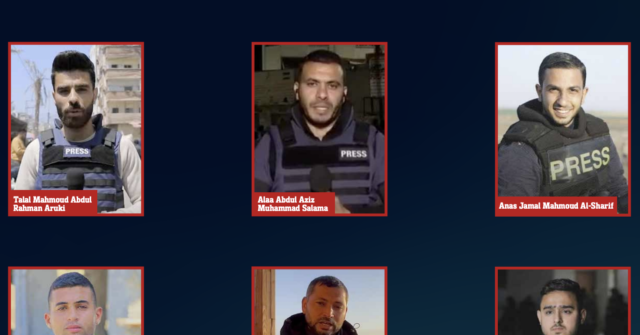On Wednesday, the Israel Defense Forces (IDF) made a controversial announcement alleging that six journalists from the Al Jazeera network operating in Gaza are, in fact, affiliated with terrorist factions linked to Iran—specifically, Hamas and Palestinian Islamic Jihad. The IDF presented what it claims to be intelligence findings and various documents sourced from the Gaza Strip, asserting that these journalists are not merely reporting on events in the region but are also functioning as military operatives for these terrorist organizations. The individuals named in this statement include Anas Jamal Mahmoud Al-Sharif, Alaa Abdul Aziz Muhammad Salama, Hossam Basel Abdul Karim Shabat, Ashraf Sami Ashour Saraj, Ismail Farid Muhammad Abu Omar, and Talal Mahmoud Abdul Rahman Aruki.
Among the accused, Ismail Farid Muhammad Abu Omar recently sustained injuries in Gaza and is highlighted in IDF documents as being directly involved in violent activities. Notably, Al Jazeera has reportedly tried to distance itself from Omar’s purported terrorist ties. The documents disclosed by the IDF reportedly include organizational charts, directories, and training records that they claim substantiate the journalists’ connections to Hamas and Islamic Jihad. The IDF’s assertions emphasize a supposed infiltration of the Al Jazeera network by these militant factions, particularly focusing on their propaganda efforts emanating from northern Gaza.
The IDF provided links to what they refer to as original documents collected in Gaza, reinforcing their accusations against the identified journalists. These materials aim to illustrate the operational and financial connections between the accused and the militant groups. In addition, the IDF released a graphic presentation to further elucidate its allegations, presumably targeting both local and international audiences in an effort to bolster its claims about the nexus between terrorism and media representation in the region.
Not long before this recent disclosure, past incidents highlighted the tenuous relationship between Israel and Al Jazeera. Earlier reports from Breitbart News mentioned an attack by IDF forces on an Al Jazeera crew that was allegedly collaborating with Abu Omar. In May, Israel took the significant step of banning Al Jazeera within its borders, accusing the Qatari-backed network of disseminating propaganda beneficial to Hamas and other militant groups. This sustained scrutiny reflects the broader contentious dynamic between Israel and media organizations perceived as sympathetic to Palestinian causes.
In response to the IDF’s allegations, Al Jazeera has vehemently denied any wrongdoing. The network characterized the accusations as reliant on “fabricated evidence” designed to discredit its journalists and undermine its reporting. This response aligns with a long-standing pattern of tension between media outlets operating in conflict zones and military establishments, particularly regarding allegations about bias, propaganda, and misinformation.
The ongoing conflict between Israel and Palestine, coupled with the complex role of media in conflict reporting, sets the stage for this emerging controversy. It raises critical questions about the intersection of journalism and military operations, as well as the responsibilities of media organizations operating in volatile environments. This situation illustrates the challenging landscape navigating press freedoms while also addressing security concerns, as both sides—Israel and the accused journalists—continue to assert their narratives in a highly polarized atmosphere.

